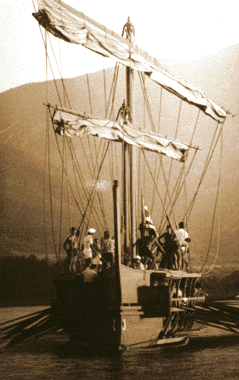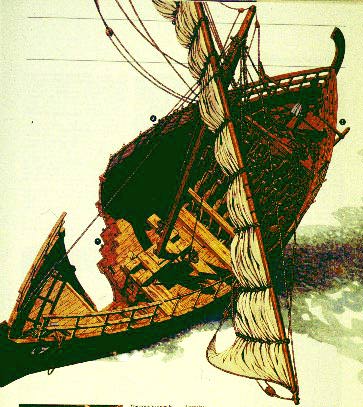
| Balbvs | Links | History |

The conquests by the Romans around the Mederraranean had removed or weaken many of the states that had policed the sea lanes allowing for the rise in piracy. With war and high taxes plauging many parts of the Med an Honest captain could be tempted by the easy pickings of piracy, especially if there was little chance of being caught.
The Roman re-action to this rising menase was half-hearted two campaigns in 102 and 100 did little. A campaign in 78, by P.Servilius Vatia (cos 79) in Cilicia started out well but was halted by the the outbreak of the Third Mithridatic War. Another attempt in 74 by M.Antonius (the father of Mark Antony), ended in his defeat of Crete. The pirates were recognised at a potent force by both Mithradates and Sertorius who both became the allies. As they grow in power so the grow in boldness attacking the coast of Italy and even Romes port, OSTIA and affecting the corn-supply.
Pompey had being looking round for a job worthy of his talents since ending the disappointing consulship of 70. In 67 he put up a tribune, Gabinius, to demand action against the pirates. An experianced genarel was to be appointed to an extra-ordinary command for three years over all the Mediterranean and fify miles inland along the coast. In the senate only Julius Caesar spoke in its favour.
What happened next was pure political pantomime. The tribune next bougth the measure before the asssembly of the people, it was quickly passed, that was when Gabinius proposed Pompey for the post. Pompey was brought forword only to have everyone believe he was not intrested 'Surely I am not the only one who loves you, nor am I alone skilled in war'(Dio Cassius,36). His own supporters had to perssude him, I don't know what he would have done if they hadn't. The outcome was not in dought the equites wanted the law and the people suffering under the high price of corn wanted the law. Some senators however feared giving one man so much power, but neither the oratory of Catulas or the threat of veto by a tribune did any good. Pompey got unprecedented power plus 6000 talents, some 500 ships, 120,000 troops, 5000 cavalrymen, and the right to appoint 24 legates.
Pompey was a great administrator, and this campaign shows how well he could cordinate action. He devided the Mediterranean into thirteen areas each under a legate (one was based at Gades). Using a mobile force Pompey then drove the pirates into the waiting section commanders. Within three months he had cleared the seas.
Plutarch's live of Pompey
Cicero's speech in favour of Pompey having the command in the east
| Balbvs | Links | History |
